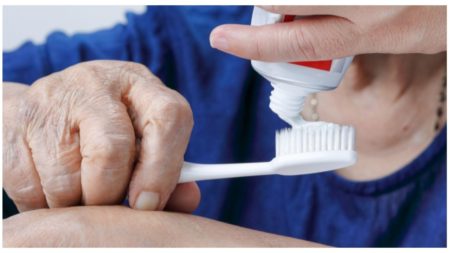This month’s selection of article excerpts includes deciding when to die, predicting dementia risk, empathy—who’s better, chatbot or your doctor, caregivers’ guide to dental care for people with dementia, and brain activity during near-death experiences.
This online tool predicts dementia – Alzheimer’s risk.
“There’s lots of information about the risk factors for dementia in the academic literature,” wrote Kaarin J. Anstey, PhD, FASSA, FAPS, Scientia Professor at the University of New South Wales School of Psychology and a senior principal research scientist Neuroscience Research Australia. “Our statistical analysis shows [CogDrisk] is a very robust and generalizable tool. It works across different countries and different data sets. And it’s also quite comprehensive, it includes a lot of the newer risk factors that weren’t previously included.”
Open AI’s ChatGPT has more empathy than your doctor.
A new study finds ChatGPT outperforms doctors in giving ’empathetic’ advice. A panel of licensed health-care professionals preferred the chatbot’s responses to nearly 200 inquiries 79 percent of the time. Compare the doctor’s and Chatbot’s responses to a patient who swallowed a toothpick. Artificial intelligence (AI) assistants could potentially aid in creating answers to patient questions via virtual health care by drafting responses that could be reviewed by clinicians.
Can the dying wait for an important event?
[12/18/2025 TCV Update: Removed URL as article no longer available.] Can a person choose when they die? Can one choose to hang on for an important event? Journalist Matthew Narvaiz thinks of his seriously ill grandmother, who died days after she met her first great-grandchild. “There is a biological process of dying, but we also know to be true that there’s a spiritual side that can’t be measured,” says Dr. Diane Sansonetti, a hospice and palliative care physician. “We can’t measure things in that realm, but that does not mean that they’re not true.”
Thank you ASA’s Generations SmartBrief for the preceding article.
ZocDoc’s Oral Health Caregiver Guide for People with Memory Disorders
 “Taking care of someone with a memory disorder can be a challenging task. Although there is much to keep track of, dental care and oral health shouldn’t be overlooked or neglected. With this in mind, [ZocDoc has] created a free, doctor-reviewed guide for caregivers that covers how to prevent your loved ones with memory disorders from developing dental issues, finding them adequate dental care, important questions to ask their dentist, and other helpful resources.”
“Taking care of someone with a memory disorder can be a challenging task. Although there is much to keep track of, dental care and oral health shouldn’t be overlooked or neglected. With this in mind, [ZocDoc has] created a free, doctor-reviewed guide for caregivers that covers how to prevent your loved ones with memory disorders from developing dental issues, finding them adequate dental care, important questions to ask their dentist, and other helpful resources.”
Bursts of Brain Activity: A Rare Look at Dying Brains Could Finally Explain Near-Death Experiences
“Researchers have long questioned whether consciousness actually continues during the dying process.” Studies with dying lab animals finds bursts of brain activity; the same, as in dying patients in a coma. The bursts occur “in the temporo–parieto–occipital junctions, which are linked to vision and hearing”—the same “junctions… linked to out-of-body experiences….”








